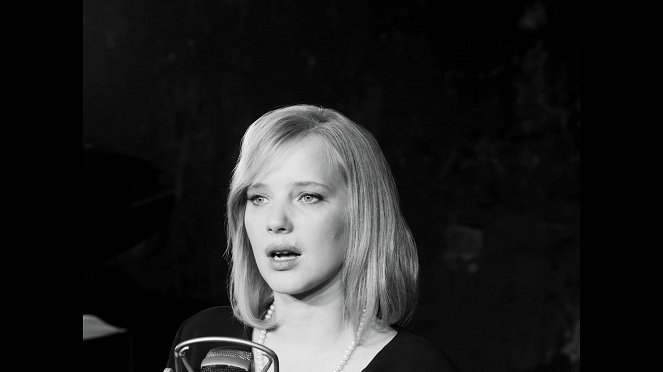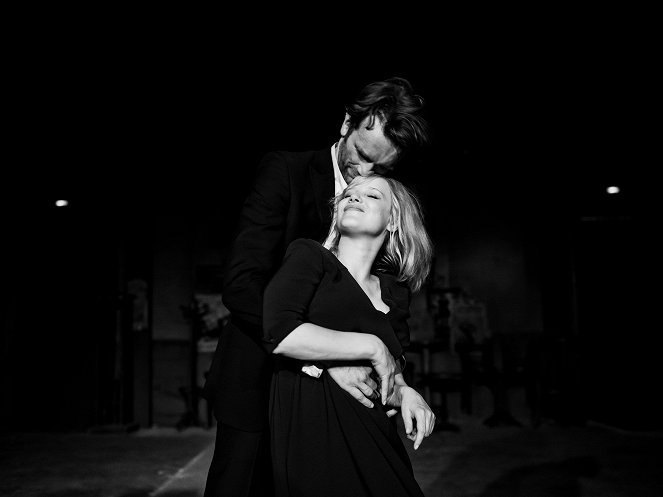Directed by:
Paweł PawlikowskiCinematography:
Łukasz ŻalCast:
Joanna Kulig, Tomasz Kot, Borys Szyc, Agata Kulesza, Cédric Kahn, Jeanne Balibar, Adam Woronowicz, Adam Ferency, Dražen Šivak, Slavko Sobin, Aloïse Sauvage (more)VOD (1)
Plots(1)
In the ruins of post-WWII Poland, pianist Wiktor (Tomasz Kot) is commissioned by the Soviet state to form a musical ensemble to help rekindle national pride. Whilst touring the villages in search of talent he meets the beautiful Zula (Joanna Kulig, in a luminous star-making turn), a fiery and charismatic singer with a past, and the two fall passionately in love. When a performance in Berlin offers the pair an opportunity for escape to the West, a last-minute decision finds them stranded on either side of the Iron Curtain. As the years march on, Wiktor and Zula - whether through political circumstance or personal impetuosity - struggle to find their moment in time... Spanning 15 years across Warsaw, Berlin, Paris and Yugoslavia, and inspired by the lives of the director’s own parents, Cold War meticulously recreates the era with virtuosic black-and-white cinematography, and an extraordinary soundtrack that is used judiciously to signify the passage of time and shifting relationships. Warmly lyrical, impossibly romantic and visually stunning, Cold War was one of the films of the year. (Palace Films)
(more)Videos (5)
Reviews (12)
At the first fleeting glance, Cold War is the opposite of Ida. Though it could seem that Pawlikowski, following the success of his inconspicuous breakout film, is banking on festival success and awards, Cold War is surprising in how it differs from Ida in every respect, except for the basic foundation of a purely personal theme and the reflection of Polish historical and moral tragedy through that theme. Nevertheless, this level lies rather on another plane this time and the screen belongs predominantly to a destructive yet elemental romance. It cannot be denied that Pawlikowski has Cold War thought out in detail, thanks to which he does not slide into mannerisms or mere copying of Ida. The storytelling through music, linking the romantic and socio-political storylines with the central motif of music, and the conceptual use of the classic format and primarily the interplay of all of the above-mentioned elements in the interest of the work’s dramaturgy and its narration prove that Pawlikowski is a brilliant director who has matured in the course of his own creative renaissance. Of course, the question arises as to what he will come up with next and whether he will go in a new stylistic direction, or if he will continue to stand at the fore of festival nostalgia following the peak era of auteur filmmaking (at which Marhoul’s The Painted Bird also stands). However, it is also necessary to recognise that Cold War (like The Painted Bird) cannot be viewed in a limited way as a mere assemblage of allusions, as these represent the absolute last of the merits of this refined and emotionally pulsating film.
()
I spent my entire youth in communist ugliness, but today I look at it like an exotic animal in a zoo somewhere. Foldyna and Kateřina Konečná probably shed a nostalgic tear at the sight of the Soviets honouring Stalin, but fortunately for the rest of us, our memories have been irretrievably swept away by time. The film thankfully doesn't get too caught up in politics and is aesthetically beautiful, I haven't seen such stunning black and white cinematography in a long time, it's a treasure these days. The love story is simple but touching, the protagonist reminded me of Léa Seydoux, charismatic and beautiful. And she sang beautifully, whether Polish folk songs, which also have something to them, or chanson. The ending is all the more crushing in its austerity, without any cheap tear-jerking.
()
This is a visually attractive melodrama about two people fated to love each other, set during the times of Stalinism in Poland. It is beautifully shot, but the screenplay does not shed enough light on the motivations of the two main characters - especially why they both keep saying how much they love each other, and yet every time they briefly live together they can hardly stand each other, constantly on and off, which means they, therefore, can not stay together. The "adversity of fate" seems like quite a convenient excuse there. It reminded me of the old Finnish drama Something in People, where there is a peculiar romance going on over a period of several years between the two main protagonists, who were also attracted to each other in a tragic way.
()
What begins as "Polish People's Republic Searches for a Superstar" smoothly transitions into a love story, which, with its fragmented nature, resembles the hazy mist of memories of a couple who didn’t want to live in oppression but didn’t know how to live in freedom. Vivid black-and-white, captivating doses of folklore, Geislerová crossed with (forgive the spoiler) the mother of Bond’s only child, and when the breeze sweeps over the tips of wheat in the fields - these are elements that elevate the otherwise rather banal story to a higher level for those unfamiliar with the experience. Thanks for the nod to Tom the cat, which added a bit of lightness. "Is you is or is you ain't my baby."
()
With Ida, Pawlikowski tested my patience with his intimate approach a while ago, but my first encounter with his work was definitely not unpleasant. Cold War is a film of a different caliber in that it is easy to watch without any issues, and it is accessible and pleasant in its own way. The question is whether this characteristic would please Pawlikowski. After all, he clearly wanted to make a drama that would make a more significant statement about his time period and the systems that dictated the direction in Europe back then. The title itself testifies to that. He wanted to show the malice of the great events that dictate the fate of the loving couple, exposing the unfortunate individuals. Unfortunately, he failed to do that, and if you want films that significantly reveal the mechanisms of social movements, you have to look elsewhere, primarily because Pawlikowski chose the wrong protagonists. In order for them to miss each other, they don't need the adversity of political systems because they are perfectly capable of creating obstacles themselves. They are the kinds of people who can keep an entire army of relationship coaches occupied and driven to despair, and at the end of their journey, they have a series of love acrobatics and probably several failed marriages behind them. They confuse love with infatuation and fail in a number of basic skills necessary to maintain a long-term partnership. Cold War is worth seeing because of its cinematography and especially for its musical dimension. Pawlikowski knows the craft of filmmaking, and he also chose solid performers for the main roles. It's just that it lacks the depth he wanted to work with. Overall impression: 75%.
()



Ads